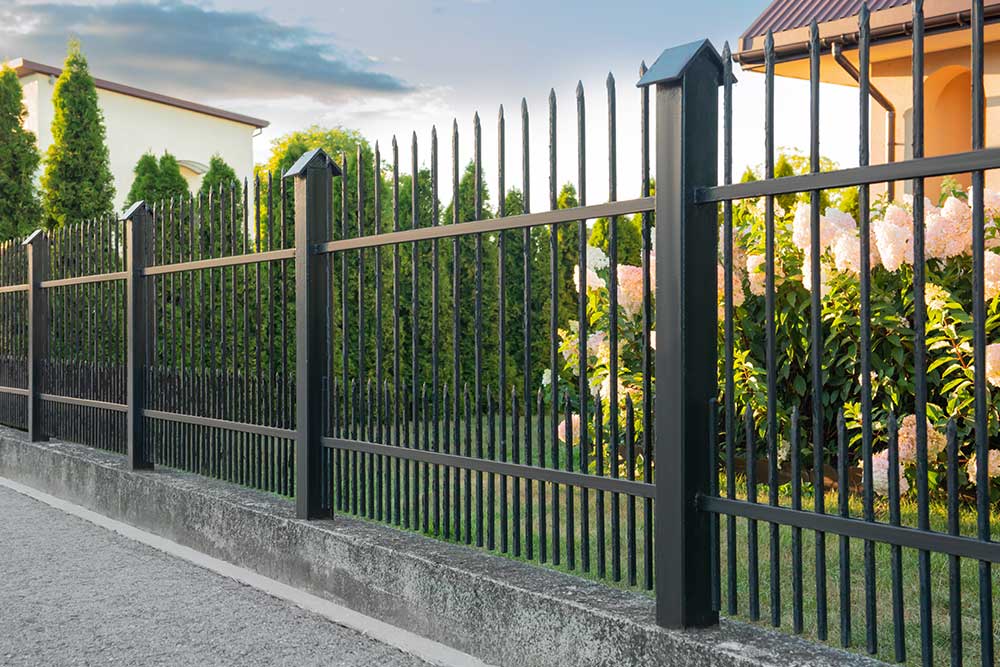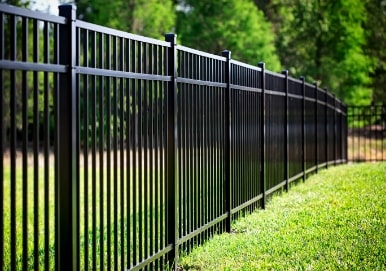When selecting the perfect fence for your home, choosing a material that aligns with your specific needs is key. Two widely preferred options are aluminum and steel. Each offers unique advantages that make them suitable for different purposes. The choice between aluminum vs. steel fences often comes down to durability, appearance, cost, and maintenance. Aluminum fences are celebrated for their lightweight, corrosion-resistant nature, while steel stands out for its incredible strength and impact resistance. To make an informed choice, it’s essential to understand the differences between these two materials and how they meet your requirements. This guide provides a detailed comparison, including factors like weather resistance, cost-effectiveness, and long-term value, so you can confidently decide which fence is the right fit for your home.

Strength and Durability
Steel fencing is widely regarded as one of the most durable options available, particularly for applications where security is a primary concern. The material’s toughness allows it to withstand significant impact, making it ideal for safeguarding properties that require enhanced protection. Steel fences can also support large gates and other heavy components without compromising their structure. While steel’s durability is unmatched in many ways, it does have some drawbacks. Exposure to salt or humid environments may lead to rust, even with protective coatings, unless additional maintenance is performed.
Aluminum fencing, on the other hand, is highly resistant to corrosion, making it perfect for areas exposed to moisture or coastal air. Though not as strong as steel, aluminum fences still offer excellent durability, particularly in residential settings where heavy-duty strength isn’t required. For example, aluminum works well for enclosing backyards, pools, or gardens while maintaining an attractive and lightweight profile. While both materials are durable, your specific application and environmental conditions play a significant role in determining which one will last longer and suit your needs best.
Maintenance Requirements
One of the biggest advantages of aluminum fencing is its minimal maintenance needs. Thanks to its natural resistance to rust and corrosion, aluminum fences need just the occasional cleaning to maintain their appearance and functionality. You can easily rinse away dirt and debris with water, keeping the fence looking fresh for years to come. Homeowners who want an attractive, low-maintenance fencing solution often gravitate toward aluminum for this reason.
Steel fences, while strong and reliable, demand more effort to maintain. To prevent rust and maintain the fence’s structural integrity, you may need to sand and repaint sections of the fence over time. Galvanized and powder-coated steel offers better resistance to weather and corrosion, but these protective layers may wear down in harsh climates or under heavy use. This additional upkeep may be a drawback for those seeking a maintenance-free option, but steel’s exceptional strength and long-term performance can outweigh these considerations for many homeowners.
Cost Comparison
Cost is a key factor in the decision-making process for many homeowners. Aluminum fencing tends to be more affordable than steel, not only in terms of material costs but also installation. Aluminum’s lightweight nature makes it easier and quicker to install, which reduces labor expenses. This affordability, combined with aluminum’s durability and low maintenance, makes it an appealing choice for residential fencing.
Steel fencing, while more expensive upfront, delivers unparalleled strength and security. The added cost reflects its robust construction and ability to handle demanding applications. For homeowners needing a fence that offers maximum protection, the higher price tag can be well worth the investment. Steel is particularly well-suited for properties requiring heavy-duty enclosures, such as commercial facilities or homes with valuable assets. However, for homeowners on a tighter budget, aluminum fencing provides a cost-effective alternative without sacrificing style or longevity.
Style and Design Options
Both aluminum and steel fences are versatile and can enhance the look of any property. Aluminum fencing is particularly known for its variety of designs, ranging from classic picket styles to sleek, modern panels. Homeowners often choose aluminum for its ability to mimic the appearance of wrought iron, offering the same elegant look without maintenance challenges. The lightweight nature of aluminum also allows for creative customization, making it easy to adapt the design to suit your home’s architecture.
Steel fencing offers a bold, sturdy appearance that complements traditional and industrial aesthetics. While steel designs are typically less varied than aluminum, their solid construction provides a clean and professional look. Decorative elements like finials, scrolls, and rings can be added to steel fences to enhance their visual appeal. The choice between aluminum and steel largely depends on your design preferences and the overall aesthetic you want to achieve for your property.
Weather Resistance
Aluminum fences excel in weather resistance, making them a popular choice for homes in regions with harsh or unpredictable climates. Unlike steel, aluminum doesn’t rust or corrode when exposed to rain, snow, or salty coastal air. This resilience makes aluminum an ideal option for fencing around pools or properties near the ocean. Its powder-coated finish not only enhances its resistance to the elements but also keeps the surface looking vibrant and new.
Steel fencing, while durable, requires more protection against weather-related damage. Galvanized steel and powder-coated finishes offer a level of rust resistance, but the material is still susceptible to corrosion over time, particularly in humid or salty environments. Homeowners in such regions may need to take additional steps to maintain their steel fence’s integrity, such as applying protective coatings or performing routine maintenance. At Good Neighbor Fence, we specialize in creating high-quality fencing solutions tailored to meet your needs.
Security and Privacy
For homeowners prioritizing security, steel fencing is often the best choice. Its strength and ability to resist impact make it a formidable barrier against intruders. Steel fences can be paired with additional security features, such as reinforced gates or taller panels, to enhance their effectiveness. This makes steel ideal for properties requiring a higher level of protection, including commercial sites or homes with valuable equipment.
Aluminum fences, while not as robust as steel, still offer a reliable level of security. Their sleek design acts as a deterrent while maintaining an open and inviting feel. For properties that don’t require maximum protection but still need a secure boundary, aluminum is a practical and aesthetically pleasing choice. Both materials can be customized to include privacy panels or decorative features to suit your preferences.
Environmental Considerations
When comparing aluminum and steel fencing, it’s important to consider their environmental impact. Aluminum is a highly sustainable material, as it is 100% recyclable. Many aluminum fences are made from recycled materials, making it an eco-friendly choice for homeowners concerned about reducing their carbon footprint. Additionally, aluminum’s long lifespan means fewer resources are used over time, contributing to its reputation as an environmentally conscious option.
Steel is also recyclable, but its production process requires more energy, which may result in a larger carbon footprint. However, its durability means it rarely needs replacement, making it a sustainable option for long-term projects. If you’re looking for a greener fencing solution, both materials offer benefits, but aluminum typically edges out steel in terms of energy efficiency and environmental friendliness. Choosing either material over wood can also save trees and reduce ongoing maintenance resources like paint and sealants.
Which Fence is Right for Your Home?
Choosing between aluminum and steel fencing ultimately depends on your property’s needs and your personal preferences. Aluminum offers a lightweight, corrosion-resistant option that’s easy to maintain and versatile in design. It’s ideal for residential properties where style and low maintenance are priorities. On the other hand, steel fencing provides unmatched strength and security, making it the preferred choice for areas requiring heavy-duty protection. While it may require more upkeep, steel’s durability and long-term performance make it a worthwhile investment for those who value its robust qualities.
Whether you select aluminum or steel, both materials offer exceptional benefits that can enhance your home’s value and security. By understanding the differences and considering your priorities, you can make an informed decision that meets your needs. If you’re ready to upgrade your property with a new fence, get a quote from Good Neighbor Fence today. Let us help you create a fence that combines style, durability, and functionality for years to come.





